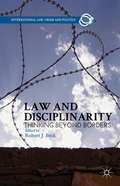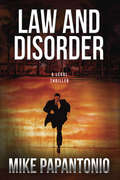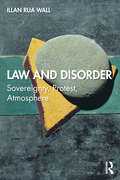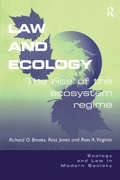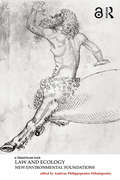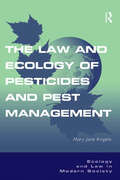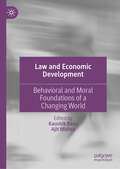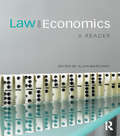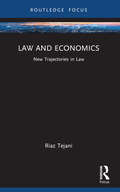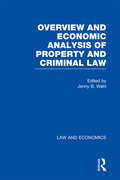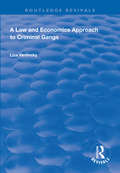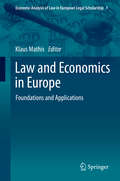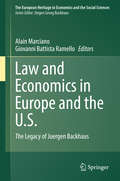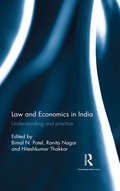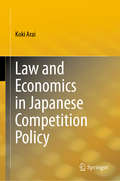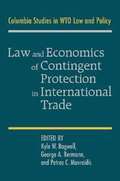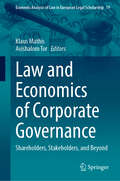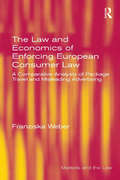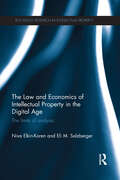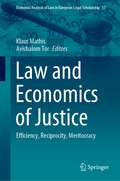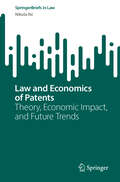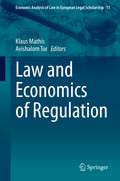- Table View
- List View
Law And Disciplinarity
by Robert J. BeckIn the twenty-first century, traditional legal borders both geographic and intellectual have been increasingly contested. Many observers have questioned whether the long-held conceptions of sovereign state boundaries remain salient in a world of technology-accelerated transnational flows of people, capital, and information. Meanwhile, scholars across the social sciences and humanities have begun crossing disciplinary borders in unprecedented ways, co-opting new methodologies and engaging in meaningful and sustained dialogue about the meaning of law in its changing global context. These emerging movements prompt important questions: what are the nature and implications of shifting legal borders? What does the future hold for them? What role do new technologies play in this evolving story? Law and Disciplinarity: Thinking beyond Borders sets forth to answer these questions by way of distinguished scholars drawn from across a wide range of disciplines, including law, political science, international relations, and communications. "
Law and Disorder
by Mike PapantonioOne of America's most successful trial attorneys built his career by going to war for consumers against the world's most powerful and corrupt corporations. But his winning streak has ended. Money, power, and politics have lined up against Nicholas Deketomis, and he must fight for his freedom, his family, and the future of his prestigious law firm.
Law and Disorder: Sovereignty, Protest, Atmosphere
by Illan rua WallFocusing on the moment when social unrest takes hold of a populace, Law and Disorder offers a new account of sovereignty with an affective theory of public order and protest. In a state of unrest, the affective architecture of the sovereign order begins to crumble. The everyday peace and calm of public space is shattered as sovereign peace is challenged. In response, the state unleashes the full force of its exceptionality, and the violence of public order policing is deployed to restore the affects and atmospheres of habitual social relations. This book is a work of contemporary critical legal theory. It develops an affective theory of sovereign orders by focusing on the government of affective life and popular encounters with sovereignty. The chapters explore public order as a key articulation between sovereignty and government. In particular, policing of public order is exposed as a contemporary mode of exceptionality cast in the fires of colonial subjection. The state of unrest helps us see the ordinary affects of the sovereign order, but it also points to crowds as the essential component in the production of unrest. The atmospheres produced by crowds seep out from the squares and parks of occupation, settling on cities and states. In these new atmospheres, new possibilities of political and social organisation begin to appear. In short, crowds create the affective condition in which the settlement at the heart of the sovereign order can be revisited. This text thus develops a theory of sovereignty which places protest at its heart, and a theory of protest which starts from the affective valence of crowds. This book’s examination of the relationship between sovereignty and protest is of considerable interest to readers in law, politics and cultural studies, as well as to more general readers interested in contemporary forms of political resistance.
Law and Ecology: The Rise of the Ecosystem Regime (Ecology and Law in Modern Society)
by Richard O. Brooks Ross JonesIn 1970 Earth Day was first celebrated marking the dawn of worldwide environmental consciousness and the passing of many environmental laws. In part, these events were the result of the maturing of the science of ecology which recognized the interdependence of the web and cycles of nature. This volume explores the relationship between ecology and environmental law, beginning with a description of the two very different disciplines. This description is followed by a history of their episodic interactions: the early period of origin, the mid-century formative period from 1950 to 1970, the initial serious period of interaction after Earth Day in 1970 and the testing of the relationship during the next two decades. Utilizing a number of case studies, examinations of the key 'linkage persons', legal instruments and the migration of ecological concepts and frameworks, this book analyzes the final flowering of an ecosystem regime which embraces the connections between the two disciplines of ecology and environmental law. Concluding with an inventory of the problems posed by the relationship between the two disciplines and an agenda for future research, this clearly structured, comprehensive and stringent book is an essential resource for all serious scholars and students of ecology and environmental law.
Law and Ecology: New Environmental Foundations (Law, Justice and Ecology)
by Andreas Philippopoulos-MihalopoulosLaw and Ecology: New Environmental Foundations contains a series of theoretical and applied perspectives on the connection between law and ecology, which together offer a radical and socially responsive foundation for environmental law. While its legal corpus grows daily, environmental law has not enjoyed the kind of jurisprudential underpinning generally found in other branches of law. This book forges a new ecological jurisprudential foundation for environmental law – where ‘ecological' is understood both in the narrow sense of a more ecosystemic perspective on law, and in the broad sense of critical self-reflection of the mechanisms of environmental law as they operate in a context where boundaries between the human and the non-human are collapsing, and where the traditional distinction between ecocentrism and anthropocentrism is recast. Addressing current debates, including the intellectual property of bioresources; the protection of biodiversity in view of tribal land demands; the ethics of genetically modified organisms; the redefinition of the 'human' through feminist and technological research; the spatial/geographical boundaries of environmental jurisdiction; and the postcolonial geographies of pollution – Law and Ecology redefines the way environmental law is perceived, theorised and applied. It also constitutes a radical challenge to the traditionally human-centred frameworks and concerns of legal theory.
The Law and Ecology of Pesticides and Pest Management (Ecology And Law In Modern Society Ser.)
by Mary Jane AngeloAlthough concerns over the ecological impacts of pesticides gave rise to the environmental movement of the late 1960s and 1970s, since that time, pesticide use and its effects have been largely ignored by the law and by legal scholars. This book addresses this omission by providing a unique and serious treatment of the significance of pesticide issues in environmental law and takes an ecological perspective on the legal issues. Dealing with a wide range of questions relating to pests and pesticides, the book focuses primarily on agricultural pesticide use as the largest contaminator in the US. It also examines the legacy of past pesticide use and analyzes how recent developments in ecological science can inform the law and increase our understanding of ecology. Interdisciplinary in its approach, the book will be of interest to academics, lawyers, scientists and environmental and agricultural professionals.
Law and Economic Development: Behavioral and Moral Foundations of a Changing World
by Kaushik Basu Ajit MishraThis book is a major stocktaking of law and economics in the context of developing and emerging economies, and in the light of the dramatic changes in the global economy that we have witnessed in recent years. The rise of artificial intelligence, digital technology, and mega platforms that collect data and facilitate trade is changing the landscape of economics. Rapid globalization has created new challenges for law and regulation, since increasingly contentious cases arise which span multiple countries and several legal jurisdictions. All these changes are giving rise to new problems in developing countries where many people lead precarious lives anyway, healthcare is minimal, and corruption widespread. Alongside these global developments, the discipline of law and economics is also undergoing profound changes, making us re-think some of the founding assumptions of the subject.
Law and Economics: A Reader (New Horizons In Law And Economics Ser. #18)
by Alain MarcianoThis book brings together the most authoritative articles on Law and Economics and the interaction between the two disciplines as well as the use of economic tools to analyse legal problems. Aimed at students experiencing the subject for the first time, the selections are interlaced with a wealth of features including explanatory introductions and exercises. Key features of the reader include: - The accessibility of the material: the articles should be understandable to those with only a limited background in economics and law. - The book’s focus on the most important and basic – foundational – issues in law and economics. - An exposition of the opposition between the different legal systems that exist in the world including common law, civil law and public law. - Debates viewed from the perspective of the scholars from a range of backgrounds are presented as well as all the key figures in economics and in law. The book should prove to be an essential resource to all students studying this burgeoning field and represents an exciting introduction to one of the key disciplines which has grown up in the social sciences in recent times.
Law and Economics: New Trajectories in Law (New Trajectories in Law)
by Riaz TejaniThis book examines the contemporary significance of the Law and Economics movement. Drawing on anthropology, sociology, political economy, and ethics, the book traces the influence of lawyer-economists in developing and operationalizing key ideas – for instance human capital and structural adjustment – that have come to be grouped under the heading of ‘neoliberalism’. It then examines how these ideas are tied to global environmental harm and to wealth inequality. Largely because of such ties, sociolegal studies tends to dismiss economic thought. This book, however, forges a path between economic and sociolegal approaches. Discussing thinkers such as Foucault and Polanyi, Calabresi and Sunstein, it demonstrates both the possibilities and limitations inherent in economistic approaches to law. Bringing together disparate and sometimes conflicting literatures, the book thereby eschews disciplinary taboos in the name of a creative, sympathetic, and critical rereading of the key ideas of Law and Economics. This book will be of interest to students and researchers in sociolegal studies, anthropology, sociology, and economics.
Law and Economics (Law And Economics Ser. #1)
by Jenny B. WahlFirst Published in 1999. Routledge is an imprint of Taylor & Francis, an informa company.
A Law and Economics Approach to Criminal Gangs (Routledge Revivals)
by Liza VertinskyFirst published in 1999. This book provides a law and economics approach towards criminal gangs which integrates the tools of economic modelling with criminal law in order to understand and address a contemporary law enforcement problem. The book draws upon ideas from economics, law and law enforcement to investigate the nature and organizational structure of criminal gangs. Law and economics are employed in varying combinations and at varying levels of specificity to generate insights into the organization and behaviour of criminal gangs. These insights are applied to evaluate alternative legal approaches and to inform the design of a new criminal law approach towards criminal gangs. Attention is focused on the organization of criminal street gangs, both because the growth and increasing sophistication of these gangs offer special challenges for law enforcement and because of the potential contributions which such an understanding could yield for economists who have traditionally focused on the organizational structure of legitimate enterprises.
Law and Economics in Europe
by Klaus MathisThis anthology illustrates how law and economics is developing in Europe and what opportunities and problems - both in general and specific legal fields - are associated with this approach within the legal traditions of European countries. The first part illuminates the differences in the development and reception of the economic analysis of law in the American Common Law system and in the continental European Civil Law system. The second part focuses on the different ways of thinking of lawyers and economists, which clash in economic analysis of law. The third part is devoted to legal transplants, which often accompany the reception of law and economics from the United States. Finally, the fourth part focuses on the role economic analysis plays in the law of the European Union. This anthology with its 14 essays from young European legal scholars is an important milestone in establishing a European law and economics culture and tradition.
Law and Economics in Europe and the U.S.
by Giovanni Battista Ramello Alain MarcianoThis volume traces the evolution of the field of law and economics from its European roots to its neoclassical "Chicagoan" period to its current identity as a more fluid, transatlantic discipline. Paying special attention to the work of German economist Juergen Backhaus, who was instrumental in the reintroduction of the European perspective to the field, this book analyzes this gradual shift in the law and economics debate and provides a state-of-the-art of the literature currently being produced by the field's most active scholars. Beginning with a discussion of the history of the field and Backhaus' role in its development, the volume provides a survey of issues central to the current debate such as legal processes in both Europe and the U. S. , constitutional political economy, regulatory law, and the ongoing evolution of the European Union. The importance of this volume is two-fold, as it firmly grounds the discipline in history while establishing a future research agenda. This book will be of use to researchers studying law and economics as well as those interested in institutional analysis.
Law and Economics in India: Understanding and practice
by Bimal N. Patel Ranita Nagar Hiteshkumar ThakkarThis is one of the first volumes that uses economic tools to analyse and evaluate law and policy in India. Applying economic theories such as incentive analysis, cost–benefit studies, and game theory, the essays in the volume negotiate contentious issues in law including property, contracts, torts, nuclear liability regime, bankruptcy law, criminal law and procedure, constitutional law, administrative law, environmental law, and family law. A radical take on commercial and socio-legal issues in India, this book will greatly interest scholars and researchers of law, political economy, and public policy.
Law and Economics in Japanese Competition Policy
by Koki AraiThis book demonstrates how economics is used in cases of competition in Japan. Competition between firms is usually the most effective way of allocating economic resources and achieving consumer and producer welfare. At the same time, a balance must be struck; firms must not be over-regulated, but neither must they be completely free to create a monopoly or oligopoly. Therefore, the role of competition policy is to maintain a balance by using the collaborative economics of industrial organization. The book uses economic analysis to evaluate case studies on Japanese anti-monopoly law, the Act Concerning Prohibition of Private Monopolization and Maintenance of Fair Trade (AMA), and enforcement in e.g. cartel cases, private monopolization cases, and merger cases. The Japan Fair Trade Commission implements a competition policy, primarily through the enforcement of the AMA, which promotes ingenuity and innovation in business by guaranteeing and enhancing fair and free competition, thereby ensuring economic vitality and consumer benefit. This book is the first authoritative and compact work on competition policy in Japan, which has a more-than-70-year history and is based on solid legal principles. In addition, the book seeks to promote law enforcement based on economic analysis, and includes studies describing the enforcement mechanisms used. It provides comprehensive yet concise information on the structure of the AMA, recent cases, and economic analysis. It also explains the circumstances regarding recent cases and analyzes how the economic policy has been applied to actual cases.
The Law and Economics of a Sustainable Energy Trade Agreement
by Richard Samans Gary C. Hufbauer Ricardo Meléndez-OrtizThe widely accepted need to reduce the world's dependence on fossil fuels and move instead to low-carbon, renewable alternatives faces a host of challenges. Whilst the greatest challenges remain in engineering, political and public policy issues continue to play a very important role. This volume, which consists of contributions from leading figures in the field, presents the case for a Sustainable Energy Trade Agreement (SETA). It shows that by addressing barriers to trade in goods and services relevant for the supply of clean energy, such an agreement would foster the crucial scaling-up of clean energy supply and promote a shift away from fossil fuels. In doing so it illustrates how the agreement would help to address a number of overarching sustainable development priorities, including the urgent threat of climate change, enhanced energy access and improved energy security. The book will appeal to academics and policymakers working on the interface of trade and energy policy. Proposes a new trade agreement that will appeal to those who understand the potential of trade to contribute to sustainable development and wish to see progress. Provides a concrete positive contribution to climate action, which contrary to other climate policies comes at a low cost, with benefits for all involved. Provides rich and groundbreaking analysis, with leading experts developing their ideas in an accessible manner.
Law and Economics of Contingent Protection in International Trade
by Kyle W. Bagwell George A. Bermann Petros C. MavroidisThe book discusses the regulatory framework of contingent protection in the World Trade Organization - antidumping, countervailing duties, and safeguards - as well as an economic analysis of these instruments. The book's various chapters illuminate the basic functioning of all three.
Law and Economics of Corporate Governance: Shareholders, Stakeholders, and Beyond (Economic Analysis of Law in European Legal Scholarship #19)
by Klaus Mathis Avishalom TorThis book aims to analyse the principles and merits of CSR and ESG approaches using a law and economics perspective. The traditional law and economics view of corporate governance emphasises profit-maximisation and a shareholder-oriented approach. This perspective, famously endorsed by Milton Friedman, suggests that a business's sole social responsibility is to maximise profits within legal boundaries. Consequently, mainstream corporate governance scholarship has focused on structuring and regulating business organisations to achieve efficiency and minimise agency costs arising from diverging interests and asymmetric information among managers, shareholders, and creditors. However, recent decades have seen increased attention to the role and interests of other corporate stakeholders, such as employees, consumers, and communities. This shift includes the concept of corporate social responsibility (CSR), which addresses ethics-based issues like working conditions, human rights, fair competition, and environmental protection. While CSR has often been a form of self-regulation, regulatory schemes now support and incentivise this practice, promoting "stakeholderism" to enhance corporate reputation and profitability while ensuring social accountability. More recently, the focus on business sustainability has intensified under the banner of environmental, social, and governance (ESG) criteria. ESG considerations are now central in the corporate world, influencing ratings, investment decisions, and corporate strategies. Despite support from some scholars and institutions, critics argue that CSR and ESG may fail to benefit stakeholders and could impose high costs on businesses and the economy. Additionally, there are concerns about whether board members and managers are properly incentivised to protect stakeholder interests, as CSR and ESG can sometimes be used to avoid regulation or advance private interests.
The Law and Economics of Enforcing European Consumer Law: A Comparative Analysis of Package Travel and Misleading Advertising (Markets and the Law)
by Franziska WeberIn the internet age, the need for effective consumer law enforcement has arguably never been greater. This timely book is a comparative law and economic analysis of the changing landscape of EU consumer law enforcement policy. EU member states are moving away from purely public or private law enforcement and now appear to be moving towards a more mixed approach, not least due to European legislation. This book reflects on the need for and creation of efficient enforcement designs. It examines the various economic factors according to which the efficiency of different enforcement mechanisms can be assessed. Hypothetical case scenarios within package travel and misleading advertising, dealing with substantial individual harm and trifling and widespread harm are used to illustrate various consumer law problems. Design suggestions on how to optimally mix enforcement mechanisms for these case scenarios are developed. The findings are then used as a benchmark to assess real life situations in countries with different enforcement traditions - the Netherlands, Sweden and England. The book is of value to both researchers and policy-makers working in the area of consumer protection.
The Law and Economics of Framework Agreements
by Albano, Gian Luigi and Nicholas, Caroline Gian Luigi Albano Caroline NicholasFramework agreements have arisen in response to the well documented and high costs of public procurement procedures. The agreements have significant potential to improve procedural efficiency in public procurement, but are complex to operate. Inadequate preparation and implementation can also frustrate their potential both to tackle waste, abuse and corruption and to enhance value for money. In this enlightening book, Gian Luigi Albano and Caroline Nicholas look at the key decisions required for designing and using framework agreements and address both legal and economic issues to give the reader a clear understanding of the planning, variables and flexibility needed for efficient implementation. This book will be of interest to policy makers, lawyers and public procurement practitioners who want to deepen their understanding of the legal and economic issues surrounding framework agreements.
The Law and Economics of Intellectual Property in the Digital Age: The Limits of Analysis (Routledge Research in Intellectual Property)
by Niva Elkin-Koren Eli SalzbergerThis book explores the economic analysis of intellectual property law, with a special emphasis on the Law and Economics of informational goods in light of the past decade’s technological revolution. In recent years there has been massive growth in the Law and Economics literature focusing on intellectual property, on both normative and positive levels of analysis. The economic approach to intellectual property is often described as a monolithic, coherent approach that may differ only as it is applied to a particular case. Yet the growing literature of Law and Economics in intellectual property does not speak in one voice. The economic discourse used in legal scholarship and in policy-making encompasses several strands, each reflecting a fundamentally different approach to the economics of informational works, and each grounded in a different ideology or methodological paradigm. This book delineates the various economic approaches taken and analyzes their tenets. It maps the fundamental concepts and the theoretical foundation of current economic analysis of intellectual property law, in order to fully understand the ramifications of using economic analysis of law in policy making. In so doing, one begins to appreciate the limitations of the current frameworks in confronting the challenges of the information revolution. The book addresses the fundamental adjustments in the methodology and underlying assumptions that must be employed in order for the economic approach to remain a useful analytical framework for addressing IPR in the information age.
Law and Economics of Justice: Efficiency, Reciprocity, Meritocracy (Economic Analysis of Law in European Legal Scholarship #17)
by Klaus Mathis Avishalom TorWhile previous volumes have examined specific issues and developments such as the coronavirus crisis or digital transformation from a law and economics perspective, the anniversary edition returns to the methodological and philosophical fundament of the discipline of law and economics. The present book aims to examine these foundations in general and, in particular, efficiency, reciprocity and meritocracy, and their relation to law and justice from an interdisciplinary perspective.Efficiency: Traditionally, the economic analysis of law has been guided by the goal of efficiency. Economists usually define efficiency as Pareto or Kaldor–Hicks efficiency. Any change that makes one member of society better off without anyone else being worse off is a Pareto improvement. A change is a Kaldor–Hicks improvement if the gainers value their gains more than the losers value their losses, with only hypothetical compensation required.Reciprocity: Economists have traditionally basedtheir models on the self-interest hypothesis of homo oeconomicus. In this model, an individual maximises his own utility without being altruistic or jealous. Behavioural economics challenges the self-interest hypothesis. In fact, many people deviate from purely self-interested behaviour. There are also signs that considerations of fairness and mutual benefit are important in bilateral negotiations and in the functioning of markets. Meritocracy: The concept of meritocracy refers to a system, organisation, or society in which people are selected and promoted to positions of success, power, and influence on the basis of their abilities and merits. This means that an individual is able to climb the social ladder through hard work. Moreover, meritocracy directs the most talented people into the most functionally important positions, thereby increasing a society's efficiency. However, the equalising function of meritocracy has been criticised. Rather than reducing inequality, meritocracy is seen as the cause of racial, economic and social inequality.
Law and Economics of Patents: Theory, Economic Impact, and Future Trends (SpringerBriefs in Law)
by Nikola IlićThis book provides a broader overview and law and economics analysis of the intricate relationship between legal frameworks governing patent granting and enforcement and their economic implications. Chapter 1 introduces a reader to the main principles and methodology underpinning law and economics. Through provided theoretical explanations, readers may gain insights into the law and economics of patents as a specific subdiscipline of law and economics that offers a valuable lens through which to view (patent-related) legal issues and policies. Chapter 2 adds further complexity to the law and economics of patents by describing and explaining the historical evolution of patents, patent granting procedures, and the scope of patent protection. Chapters 3 and 4 provide a more fine-grained analysis of patent law and related legal institutes. Chapter 3 explores economic justifications for patents and the trade-off between innovation and efficiency. Subsequently, it explores specific issues, such as patent race and patent thicket, and the role of patent enforcement in technology transfers and licensing. Chapter 4 embarks on a journey to quantify and illuminate the multifaceted economic impact of patents, focusing on their pivotal role in driving innovation and shaping market dynamics. Chapter 5 navigates the evolving landscape of patent law and policy and provides insights into the recent changes, persistent challenges, and emerging trends that shape the future of the patent system. It begins by examining recent shifts in patent law and policy, highlighting how legislative and judicial reforms have aimed to address issues of patent quality and the delicate balance between the use and abuse of patents. Moreover, it delves into the role of patents in shaping and protecting emerging technologies, from artificial intelligence and biotechnology to clean and sustainable energy. Concluding remarks and policy reflections follow in Chapter 6.
Law and Economics of Possession
by Yun-Chien ChangPossession is a key concept in both the common and civil law, but it has hitherto received little scrutiny. Law and Economics of Possession uses insights from economics, psychology and history to analyse possession in law, compare and contrast possession with ownership, break down the elements of possession as a fact and as a right, challenge the adage that 'possession is 9/10 of the law', examine possession as notice, explain the heuristics of possession, debunk the behavioural studies which confuse possession with ownership, explore the LightSquared dispute from the perspective of 'possession' of spectrum frequency and provide new insights to old questions such as first possession, adverse possession and property jurisdiction. The authors include leading property scholars, who examine possession laws in, among others, the USA, UK, China, Taiwan, Japan, Germany, France, Israel, the Netherlands, Spain, Portugal, Italy, Austria.
Law and Economics of Regulation (Economic Analysis of Law in European Legal Scholarship #11)
by Klaus Mathis Avishalom TorThis book explores current issues regarding the regulation of various economic sectors, theoretically and empirically, discussing both neoclassical and behavioural economics approaches to regulation. Regulation has become one of the main determinants of modern economies, and virtually every sector is subject to general laws and regulations as well as specific rules and standards. A traditional argument to justify regulatory interventions is the promotion of public interests. Fixing markets that lack competition, balancing information asymmetries, internalising externalities, mitigating systemic risks, and protecting consumers from irrational behaviour are frequently invoked to complement the invisible hand of the market with the visible hand of the state.However, regulations can lead to unintended consequences, and serve the interests of powerful private interest groups rather than the public interest and social welfare. In addition, new insights from behavioural economics question the traditional regulatory approaches, most prominently in attitudes towards consumers. Furthermore, digitalisation and technological innovation in general present new challenges in terms of both the type of regulation and the regulatory process.Part I of this book discusses various theoretical approaches to the economic analysis of regulations, while Part II looks at specific applications of the law and economics of regulation.
